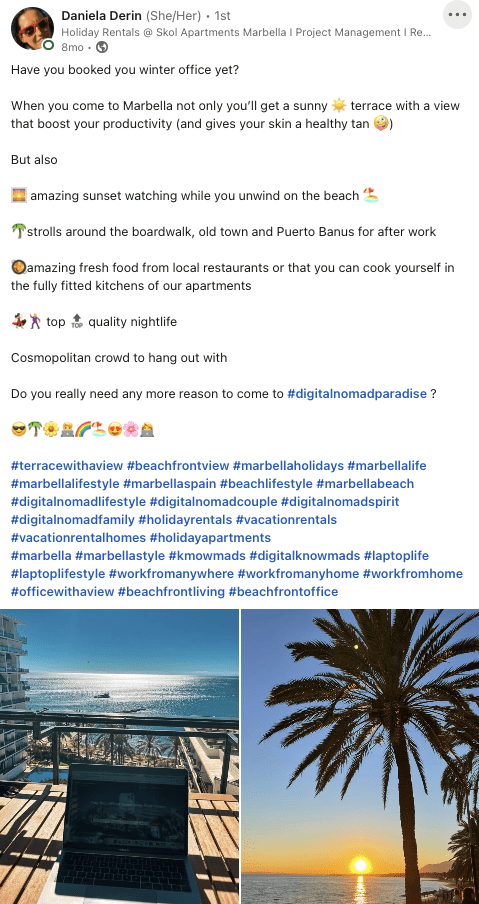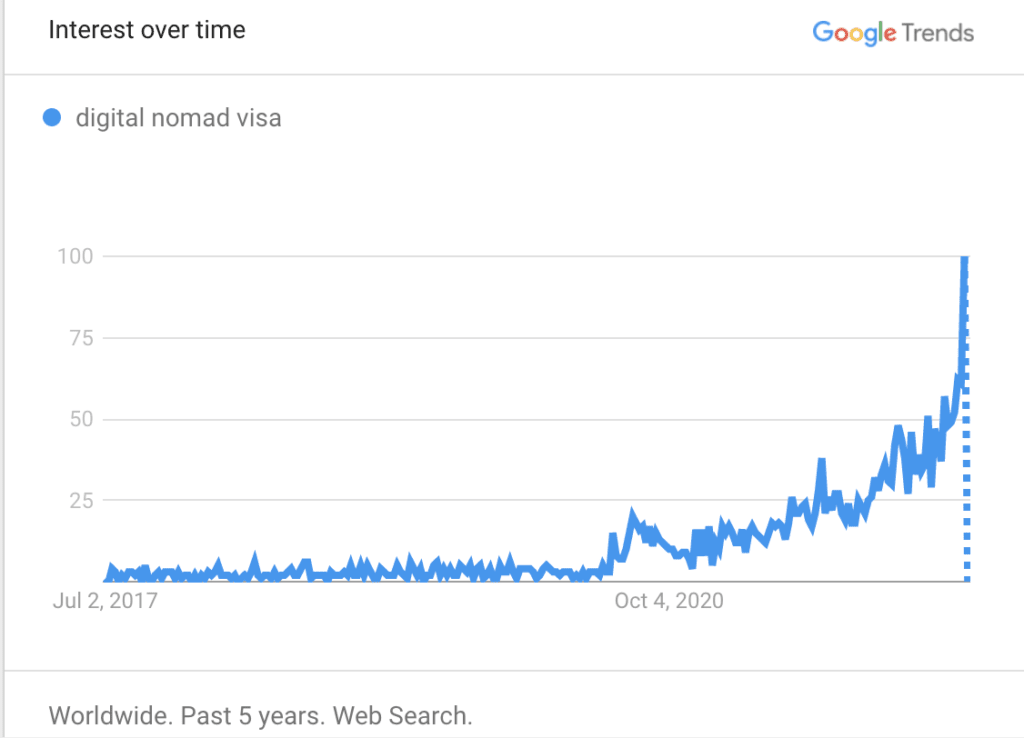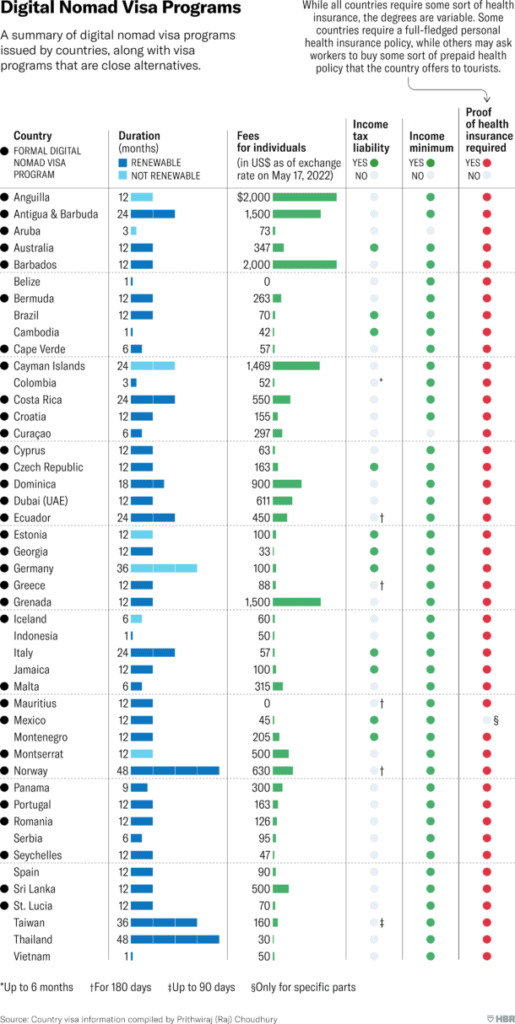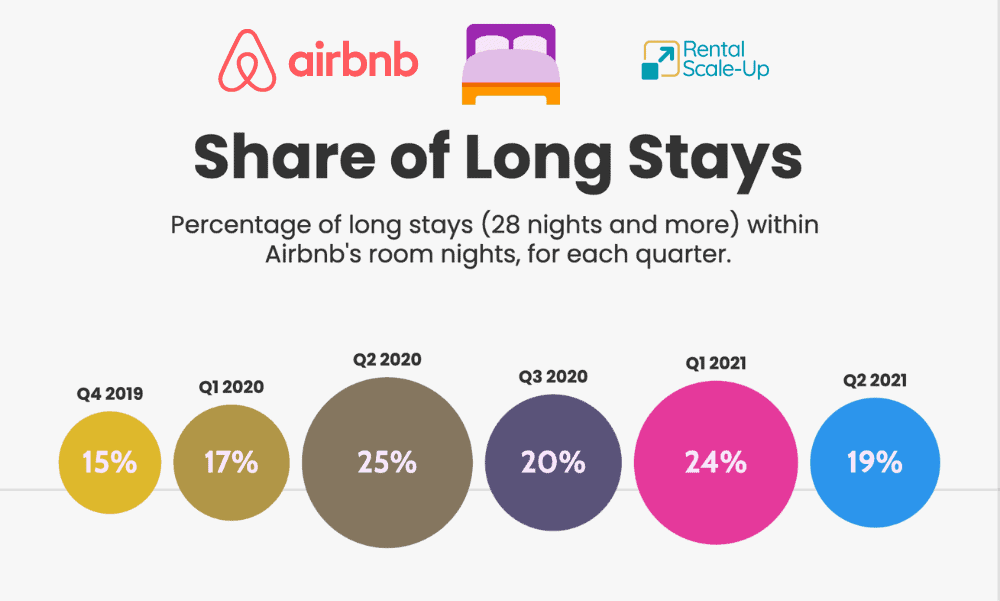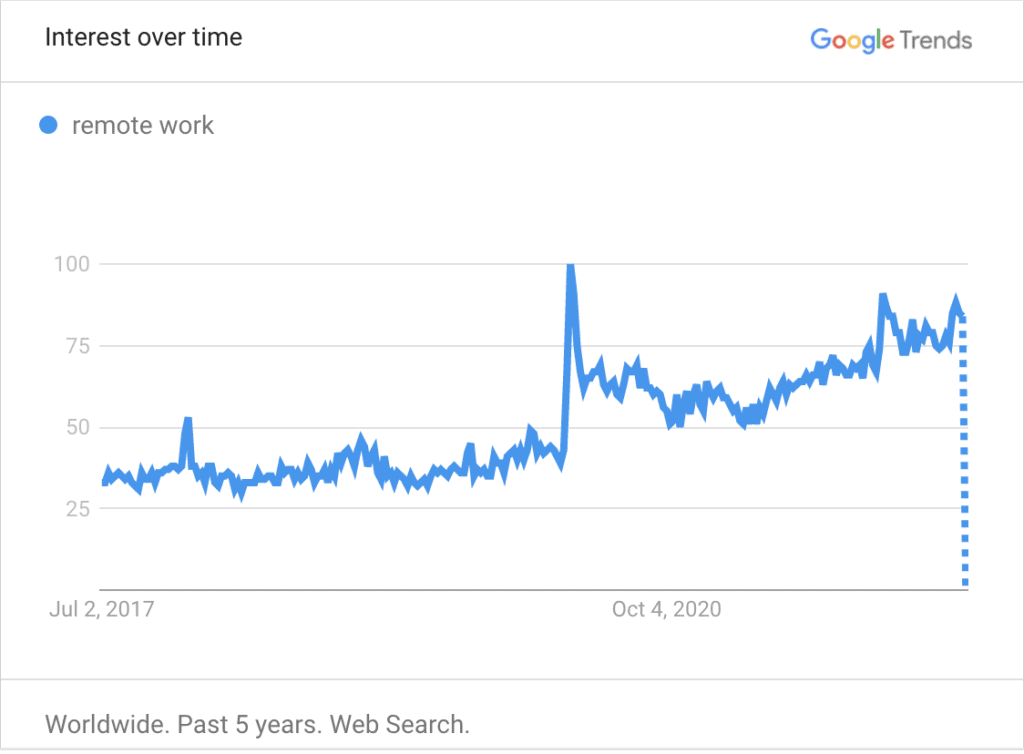Should all short-term rental managers and owners try and attract digital nomads? At the start of the COVID-19 pandemic, a few destinations like Bali were deserted by tourists but did record a fair number of digital nomads opting to stay at beautiful villas whose rates were often 70% cheaper than normal. After two years of recovery, with demand for traditional vacation rental markets still beating records and urban destinations finally attracting more people, does it still make sense to think about digital nomads? In 2022, a lot of countries now offer digital nomad visas, while Airbnb is working with several destinations to promote them as digital nomad havens, through its “Live and Work Anywhere” program. Yet, other voices disagree and say that giving the priority to steady targets such as families over digital nomads would make more sense for many destinations.
A few weeks ago, Rafat Ali, CEO of travel industry news website Skift, said that, for most destinations, it was a fool’s errand to “chase the mythical digital nomads and have a strategy for it”. His post generated more than 70 comments, with travel experts debating whether all destinations should be targeting digital nomads.
Before the COVID-19 pandemic, the term “digital nomad” was much less mainstream than today. You could meet digital nomads in key hubs such as Chiang Mai in Thailand, Canggu in Bali, and Medellin in Colombia. These destinations combined affordable serviced accommodations (e.g. an apartment with weekly cleaning in Chiang Mai, a villa with daily maid service in Bali), interesting food options, reasonably fast internet connections, co-working spaces, and bars where like-minded travelers could meet up. Digital nomads would usually travel there on tourist visas and work without being too much noticed by local authorities (except for a few raids on coworking spaces operated by the Thai military police).
How the pandemic introduced more short-term rental operators to the world of digital nomads
In 2020 and 2021, many short-term rental operators tried to attract digital nomads to make up for the loss of leisure and business travelers. In some places, like Bali, digital nomads decided to stay put and to negotiate discounts up to 80% to stay at very nice villas.
In other locations, property managers discovered digital nomads by chance, learned to like them, and decided to keep targeting them in the years to come. This is how Daniela from Skol Apartments Marbella Holidays recounts her experience:
In the 2020/2021 winter season, when much of Europe was in lockdown, 90% of our guests were digital nomads and remote workers. Only 10% were leisure guests, brave enough to travel to Spain. During this 2021/2022 winter season, we recorded a 90% occupancy rate. 50% of our guests were still digital nomads, so it’s been a great win. In our case, it’s a great crowd to have as they’re interesting professionals who are ideal to have a chat with after work. They help us be nearly fully booked in the off-season months and not rely only on leisure guests who are mostly pensioners.
It all started as a joke. In March 2020, I was so busy replying to cancellation emails that I started working with my laptop for the balconies of the properties we manage. My partner Vincenzo took pictures of me to show off “Daniela’s sunny office”. I put those pictures on Instagram, Facebook, and Linkedin, saying “As we have many empty sunny balconies, we’re converting them into offices with views”. The response was amazing. As a result, we got many bookings from digital nomads starting September 2020 even if traveling was still tricky. We managed to make our owners a small profit in challenging times thanks to this pivot.
At the same time, vacation rental listing websites targeting remote workers, such as flOasis, launched their operations to enable off-the-beaten-path properties to get more visibility and jump on the digital nomad bandwagon too.
This is how Kristina Kutan, flOasis’s co-founder, was presenting her company to Rental Scale-Up:
- Listings that offer the guarantee of stays with beautiful surroundings, wifi & workspaces, nice owners, common areas to socialize, and activities to help unplug.
- A booking platform for remote workers and digital nomads who are looking for the perfect experience in order to be more productive at work remotely. The site also benefits independent owners by giving them access to trusted customers seeking their services or accommodations far away from busy urban centers.
- A strong community that features events created just so it can bring together people from all over the world as well as locals too!
In 2022, digital nomad visas and Airbnb’s Live and Work Anywhere initiative promise a steady source of bookings for short-term rental managers
Yet, in 2022, as room nights sold in Europe and the US are once again breaking records, you may think that vacation rental managers and owners have better things to do than capture a market that can sometimes look elusive.
Digital nomad visas
Before the pandemic, a few countries had digital nomad visas. Countries such as Estonia were offering an e-residency program that was easily accessible, for instance. In 2022, the list of destinations with an official digital nomad visa has grown much longer. In essence, visa holders can stay and legally work in the country for up to 6 months, against a fee and some documentation (e.g. proofs of income and activity).
On Google, the number of searches linked to the phrase “digital nomad visa” has exploded and remains high.
Here’s a list compiled by Prithwiraj (Raj) Choudhury and published in the Harvard Business Review:
As a result, vacation rental managers and owners in countries offering such visas may want to create a page on their website targeting digital nomads. For instance, they could publish detailed information about how to obtain this visa and why their destination is the best in the country to live and work.
Airbnb’s Live and Work Anywhere initiative
Since April 2020, Airbnb has done a lot to position itself as a place to book monthly stays. For instance, more than 90% of all Airbnb listings are now accepting 1-month stays. Technical innovations such as Split Stays allow Airbnb to offer long stays split into two different listings. As such, the platform has gone beyond offering only short stays. Even Booking.com has started accepting monthly rentals but in a much more limited way in terms of locations.
The share of long stays on Airbnb grew during the pandemic, yet is going back to base as demand patterns come back to normal. However, as the volume of booked nights on Airbnb has grown so much, it means that the overall number of long-stay nights booked has drastically increased.
Airbnb has a history of working with local tourism boards and travel groups. It helps the company create local support with politically well-connected groups, localize its marketing campaigns, and usually generate more domestic demand. For instance, its Rural Bootcamp program wanted to “unlock the power of rural tourism”.
In Spring 2022, Airbnb launched its Live and Work Anywhere program. Here’s how the company presented the initiative:
In order to embrace this trend of worker flexibility, Airbnb is working collaboratively with governments to specifically support efforts to bring remote workers to their communities. Airbnb is launching the Live and Work Anywhere initiative to partner with governments and Destination Marketing Organisations (DMOs).
Here’s what Airbnb wants to create through this program:
- With support from Airbnb, select destinations will work to develop a sustainable infrastructure for remote workers that also takes into consideration the existing environment and the needs and priorities of locals.
- In parallel, Airbnb will create a bespoke online landing page for the destination, a one-stop shop for aspiring remote workers that showcases each partner destination. This landing page will be promoted by Airbnb, in close coordination with the destination partner.
Here are the type of destinations that Airbnb is looking for:
Easy to get there, stay, and get around
Our partners should have favorable mechanisms for remote workers to enter, stay, and commute around the destination including:
- Visa policies that facilitate remote working for travelers
- Keeping cost of living and affordability for remote workers top-of-mind
- Offering free or discounted access to public transportation or car rentals
Easy to work
Our destination partners should strive to work with local stakeholders to improve visitor access to technology, space, and amenities to be able to work productively and collaborate, including:
- Access to strong Wi-Fi
- Strong cellular service
- Spaces suitable for co-working
Connection and culture
Our partners should implement ways to help remote workers to connect with locals and immerse themselves in their destination by offering access to:
- A vibrant local culture for guests to discover–for example, an exciting dining scene, unique cultural venues or great outdoor activities
- Cultural immersion courses such as language, cooking, art or dance classes
- Opportunities to volunteer in the local community
Digital nomads: Work from the Caribbean
The program is already up and running in the Caribbean. Unlike South-East Asia, Caribbean islands have not always been identified as hot spots for digital nomads: Places like Bali and Thailand are big enough to offer digital nomad hubs and off-the-beaten-track adventures, with great service and affordable food options.
Yet, longer stays also hit the Caribbean during the COVID pandemic. According to Airbnb’s data:
- The share of nights booked for long-term stays in Q1 2022 almost doubled compared to the same period in 2019.
- In Q1 2019, almost 6% of all bookings were for long-term stays, while in Q1 2022 this percentage reached almost 10%.
- The number of nights booked for long-term stays tripled in Q1 2022 compared to Q1 2019.
Airbnb and the Caribbean Tourism Organization (CTO) have partnered to promote the Caribbean as a viable destination to live and work anywhere, through the launch of their “Work from the Caribbean” campaign.
Airbnb has created a main landing page for the campaign, as well as one landing page per destination. Note that the program only covers destinations that are officially part of the Caribbean Tourism Organization. For instance, islands such as Guadeloupe, Cuba, Puerto Rico, and St Barths are not members. Here are the participating destinations:
- Anguilla
- Antigua & Barbuda
- Barbados
- Belize
- British Virgin Islands
- Cayman Islands
- Dominica
- Guyana
- Martinique
- Montserrat
- Saint Lucia
- St. Eustatius
- St. Kitts
- St. Maarten
- Trinidad
Betting on remote workers rather than on digital nomads
Not every destination can become a hub for digital nomads: good international connections, reliable internet connections, affordable housing, and food options are a must. A lot of digital nomads are freelancers with revenues that can go further in more affordable destinations than back home.
We could also add that digital nomad hubs tend to homogenize after a while, as digital nomads expect to be able to use the same set-ups from Bali to Medellin. At some point, many local co-working spaces look alike, with the same baristas, poké bowl corners, and the same language (English) as a lingua franca. Interactions with locals are sometimes quite limited. As a result, not every destination may want to become such a hub.
Yet, even expensive locations can be great places for remote workers. These travelers tend to work for only a couple of weeks or months, before returning to their home base. Some of them may be full-time employees at big tech companies, with decent salaries. They may also come with a young family in tow.
The number of searches for the phrase “remote work” has exploded and remains high, showing that there may be here more than a COVID fad. Short-term rental managers and owners may want to think about whether they want to cater a little or a lot to the remote worker crowd.
Even if some property managers are not interested in targeting digital nomads, they need to make sure that a fair share of their properties can serve the needs of remote workers. After all, even past guests can suddenly turn into remote workers and want to work from a destination they like. How to serve them? For instance, Airbnb has added filters to give more visibility to listings with a dedicated workspace and verified wifi speed.


